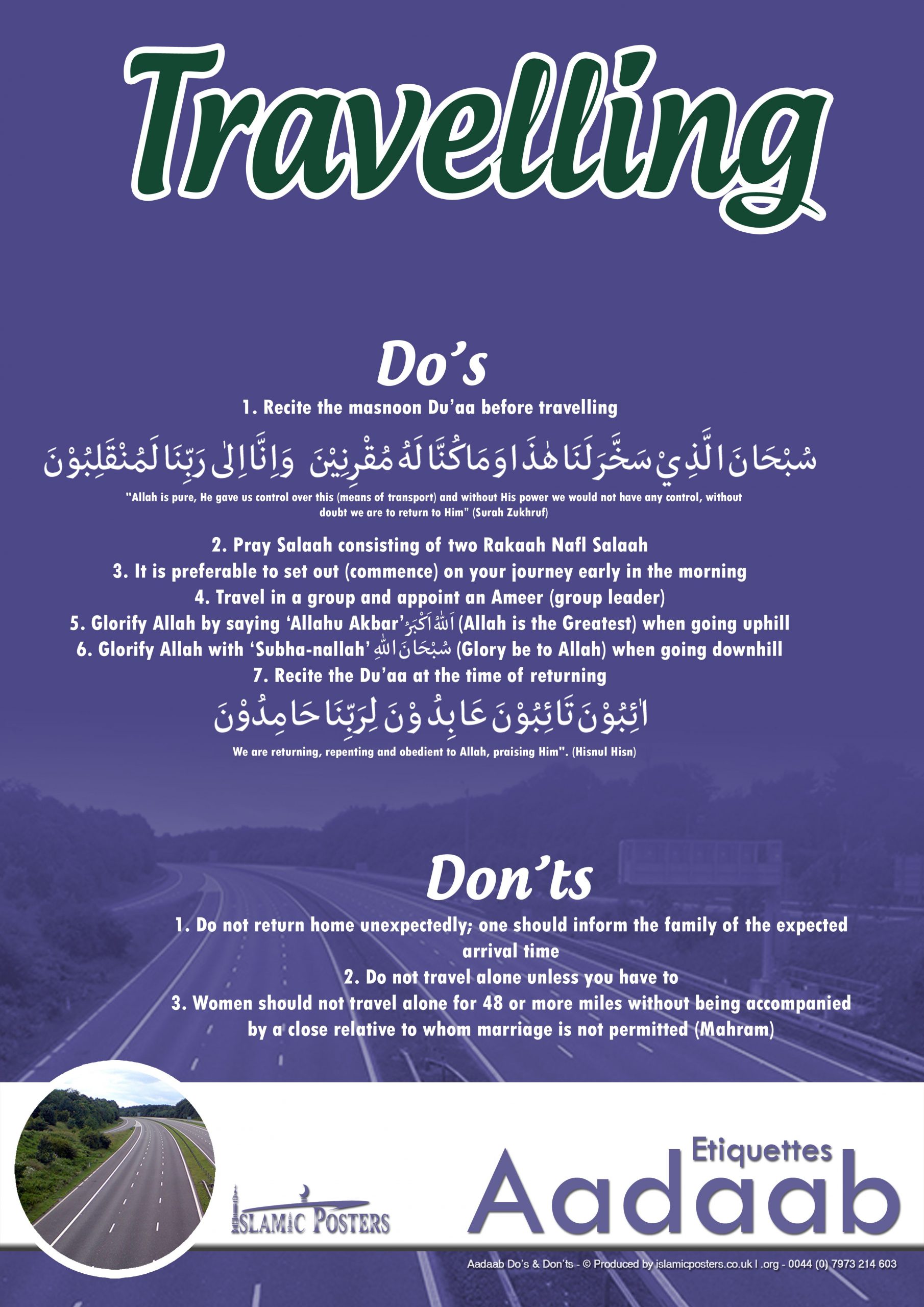In Islamic teachings, the concept of "adab" holds great importance. Adab refers to proper etiquette and manners that should be exhibited in various aspects of life, including traveling. Traveling, or "jaulah," can be for various purposes, such as for business, leisure, or pilgrimage. Regardless of the purpose, it is important for Muslims to observe certain adab-adab jaulah, which are the etiquettes of traveling. These etiquettes help maintain harmony, respect, and a positive experience during the journey.
1. Seeking Permission and Blessings
Before embarking on a journey, one should seek permission and blessings from their family, especially parents or guardians. It is important to show respect and concern for their feelings and well-being. Seeking their blessings not only strengthens family bonds but also ensures a safer and more prosperous journey.
2. Making Intention for Travel
Intention plays a significant role in Islam. When preparing for a journey, Muslims should have a clear intention for their travel. This intention should revolve around seeking halal sustenance, personal growth, acquiring knowledge, serving others, or performing religious obligations. By setting a positive intention, Muslims can transform their travel into a rewarding experience that benefits both their worldly and spiritual life.
3. Packing with Moderation
When it comes to packing, adhering to moderation is key. Excessive luggage not only burdens the traveler but also causes inconvenience for others, particularly when using public transport. It is essential to pack only the necessary items and avoid unnecessary extravagance. Additionally, travelers should pack their belongings in a neat and organized manner to maintain cleanliness and ease of access.
4. Being Punctual
Punctuality is highly valued in Islam. Travelers should make a conscious effort to be punctual for departure, arrival times, and any planned activities during the journey. Being punctual shows respect for others’ time and helps to avoid unnecessary delays or inconveniences for fellow travelers.
5. Respecting Others
During the journey, travelers should exhibit kindness, patience, and respect towards fellow passengers, as well as transport staff. This includes refraining from loud conversations, playing music or videos at high volumes, and being considerate of personal space. Respecting others helps create a harmonious and pleasant environment for everyone involved.
6. Upholding Personal Hygiene
Maintaining personal hygiene is of utmost importance during travel. Travelers should ensure they are well-groomed, wear clean clothes, and practice good oral hygiene. Proper hygiene not only promotes physical well-being but also reflects a sense of cleanliness and decency, which is an essential aspect of Islamic adab.
7. Observing Safety Measures
In Islam, personal safety is of great importance. Travelers should prioritize their well-being by following safety measures, whether it be while driving, using public transportation, or staying in unfamiliar places. This includes fastening seat belts, following traffic rules, and ensuring the security of personal belongings. Taking precautionary measures helps in avoiding potential harm and ensures a safe journey for oneself and others.
8. Engaging in Remembrance of Allah
Traveling provides an opportunity for spiritual reflection and connection with Allah. Muslims are encouraged to engage in dhikr (remembrance of Allah), recite Quranic verses, or listen to beneficial Islamic lectures or podcasts during the journey. This helps in maintaining spiritual focus and finding solace in the midst of travel challenges.
9. Seeking Knowledge and Cultural Understanding
Traveling exposes individuals to different cultures and traditions. Muslims should seize this opportunity to broaden their knowledge, gain an understanding of local customs, and appreciate the diversity of the world. Showing openness, respect, and a willingness to learn helps foster positive interactions and promotes harmony among people of different backgrounds.
10. Gratitude and Supplication
Finally, throughout the journey, travelers should express gratitude to Allah for the opportunity to travel and experience new places. Muslims should also engage in supplication (dua), seeking Allah’s protection, guidance, and blessings during the journey. Expressing gratitude and making dua not only increases spirituality but also helps create a positive mindset and a sense of contentment throughout the travel experience.
In conclusion, the adab-adab jaulah, or etiquettes of traveling, are essential aspects of a Muslim’s journey. By adhering to these etiquettes, travelers can ensure a more pleasant and rewarding experience for themselves and those around them. These etiquettes encompass seeking permission and blessings, making a clear intention, practicing moderation in packing, being punctual, respecting others, observing personal hygiene and safety measures, engaging in remembrance of Allah, seeking knowledge and cultural understanding, and expressing gratitude and supplication. By embodying these etiquettes, Muslims can fulfill their religious obligations while also maintaining respect, harmony, and a positive attitude during their travels.




